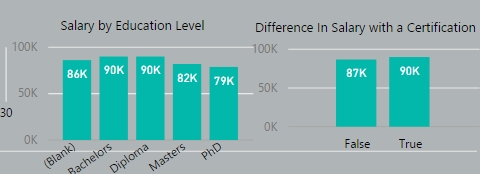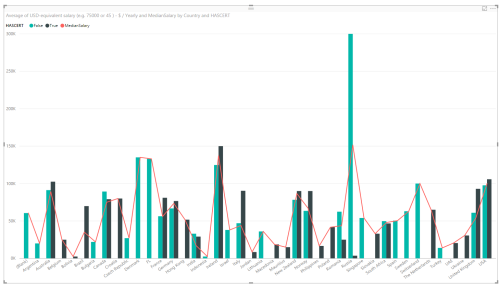2016 Salary Survey in PowerBI
-
March 12, 2017 at 10:30 pm
Comments posted to this topic are about the item 2016 Salary Survey in PowerBI
-
March 13, 2017 at 6:35 am
hi,
thanks for the post. Can you add the underlying data-set you have used in this tutorial? it would be helpful to do a hands-on
thanks
-
March 13, 2017 at 7:46 am
ifthenelsenullif - Sunday, March 12, 2017 10:30 PMComments posted to this topic are about the item 2016 Salary Survey in PowerBIHi,
It is a very amazing post.
Thank you for this. I am from Spain and It's good for me to know which is the average salary and the average education.Is there any field with the real age of the people (not experience years)?
Thank you again for so good post
Regards
-
March 13, 2017 at 7:50 am
Other thing that I have seen surprisingly is about the certifications
There is a very small difference between people with and without.
It could be a good idea to make a difference of this chart in every country. I am sure that in several countries will can be bigger the difference.
Regards
-
March 13, 2017 at 8:29 am
baiju04 - Monday, March 13, 2017 6:35 AMhi,thanks for the post. Can you add the underlying data-set you have used in this tutorial? it would be helpful to do a hands-on
thanks
Here's a git repo link Thanks for the reply! The raw inital data can be obtained from this site
jorge_vicente - Monday, March 13, 2017 7:50 AMOther thing that I have seen surprisingly is about the certifications
There is a very small difference between people with and without.
It could be a good idea to make a difference of this chart in every country. I am sure that in several countries will can be bigger the difference.
Regards
It's actually pretty close

However it can be outliers in a lot of places there's just not enough people to make a good estimate. -
March 13, 2017 at 8:35 am
So, our Russian and Irish brothers are at the top of the chart in terms of median salary, even after standardizing to USD equivalent?
Next time you guys are buying the drinks. :rolleyes:"Do not seek to follow in the footsteps of the wise. Instead, seek what they sought." - Matsuo Basho
-
March 13, 2017 at 8:45 am
One suggestion that would greatly improve the usefulness of the data, so as to accommodate for the relative sparsity of the data, is to limit industry to a selection of 20 or so categories, rather than allowing participants to enter it free-form. For example, I'm seeing 'Telecommunications', 'Telecom', 'IT & Telecommunications' split out separately. Also, 'Healthcare' and 'Healtcare'. There are also several variations of Technology.
"Do not seek to follow in the footsteps of the wise. Instead, seek what they sought." - Matsuo Basho
-
March 13, 2017 at 9:00 am
Nice article!
Where did you get source data?Thanks!
-
March 13, 2017 at 9:45 am
[quoifthenelsenullif - Monday, March 13, 2017 8:29 AMIt's actually pretty close
However it can be outliers in a lot of places there's just not enough people to make a good estimate.[/quote]
Yes, not enough people to make a good estimations 🙁
But, it is a very helpfuly data. Nice work again!Regards
PD: I cannot fix the "[quo" in the post :doze:
-
March 13, 2017 at 12:12 pm
I would like to see you put years experience against salary. Does time really equal money? Is there age discrimination? I agree with the category limitation mentioned. Free form is just too many typo's
-
March 13, 2017 at 12:26 pm
Dan Guzman - Not the MVP - Monday, March 13, 2017 12:12 PMI would like to see you put years experience against salary. Does time really equal money? Is there age discrimination? I agree with the category limitation mentioned. Free form is just too many typo'sSomewhat but again with the limited data and outliers it's hard to say.

-
March 13, 2017 at 12:35 pm
tipums123 - Monday, March 13, 2017 9:00 AMNice article!
Where did you get source data?Thanks!
-
March 14, 2017 at 2:28 am
Dan Guzman - Not the MVP - Monday, March 13, 2017 12:12 PMI would like to see you put years experience against salary. Does time really equal money? Is there age discrimination? I agree with the category limitation mentioned. Free form is just too many typo'sYes!! It is a very good point. I am sure that could be an age discrimination in the salaries!
-
March 14, 2017 at 7:29 am
Dan Guzman - Not the MVP - Monday, March 13, 2017 12:12 PMI would like to see you put years experience against salary. Does time really equal money? Is there age discrimination? I agree with the category limitation mentioned. Free form is just too many typo'sI don't know if this could be measured, but my belief is that, broadly speaking, employers don't pay for experience quantitatively in terms of years in the industry but rather tend to pay for more qualitative metrics like past positions held, roles, and skill-sets. It's easy to say "I've been a DBA for 12 years.", but the problem is that most respondents could not accurately evaluate themselves on the more qualitative metrics. Even a question like what specific technologies the respondent has experience with is subjective. I guess the best way to frame the question would be "Do you use XYZ in your professional career, and do the people you report to at work regard you as experienced with XYZ? Yes / No", rather than simply "Do you know XYZ? Yes / No". It's more about people's impression of your knowledge and experience that determines your salary, not your own personal opinion. It is still possible for talented and experienced people to be under-rated or under-utilized, thus resulting in a lower salary, however, your own personal opinion is still important for other reasons, like giving your the confidence to move on or move up to another position that better leverages your talent.
"Do not seek to follow in the footsteps of the wise. Instead, seek what they sought." - Matsuo Basho
-
March 14, 2017 at 3:42 pm
Eric M Russell - Tuesday, March 14, 2017 7:29 AMDan Guzman - Not the MVP - Monday, March 13, 2017 12:12 PMI would like to see you put years experience against salary. Does time really equal money? Is there age discrimination? I agree with the category limitation mentioned. Free form is just too many typo'sI don't know if this could be measured, but my belief is that, broadly speaking, employers don't pay for experience quantitatively in terms of years in the industry but rather tend to pay for more qualitative metrics like past positions held, roles, and skill-sets. It's easy to say "I've been a DBA for 12 years.", but the problem is that most respondents could not accurately evaluate themselves on the more qualitative metrics. Even a question like what specific technologies the respondent has experience with is subjective. I guess the best way to frame the question would be "Do you use XYZ in your professional career, and do the people you report to at work regard you as experienced with XYZ? Yes / No", rather than simply "Do you know XYZ? Yes / No". It's more about people's impression of your knowledge and experience that determines your salary, not your own personal opinion. It is still possible for talented and experienced people to be under-rated or under-utilized, thus resulting in a lower salary, however, your own personal opinion is still important for other reasons, like giving your the confidence to move on or move up to another position that better leverages your talent.
O'Reilly did a really amazing Salary Survey which I found after I wrote this. It's here, and it's awesome. It's not database specific as it's data science but they had significant volumes and did the statistics on it so you can see it does matter.
[Quote]Age, Experience, and IndustryExperience and age are two important variables that influence salary. The coefficient for experience (+3.8) translates to an increase of $2K–$2.5K on average, per year of experience. As for age, the biggest jump is between people in their early and late 20s, but the difference between those aged 31–65 and those over 65 is also significant.
Experience and age are two important variables that influence salary. The coefficient for experience (+3.8) translates to an increase of $2K–$2.5K on average, per year of experience. As for age, the biggest jump is between people in their early and late 20s, but the difference between those aged 31–65 and those over 65 is also significant.[/quote]
You have to register but it's free after you do. It was basically what I really wanted here, it's that good. It's what we should aspire to every year.
Viewing 15 posts - 1 through 15 (of 16 total)
You must be logged in to reply to this topic. Login to reply


